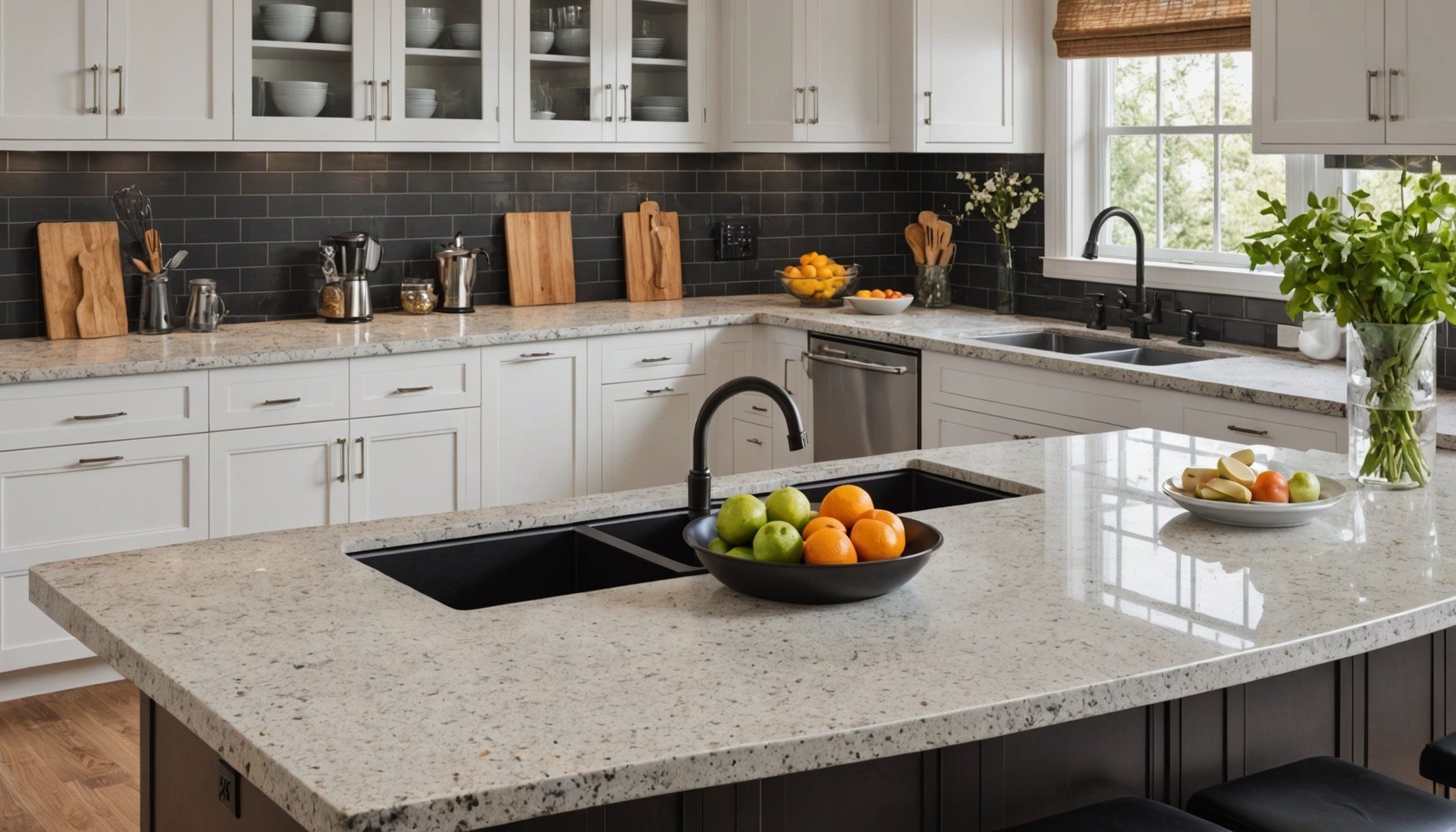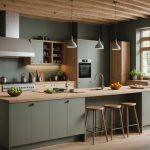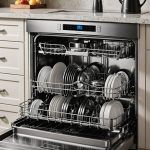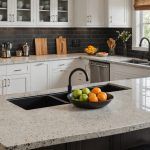Ultimate Guide to Selecting Kitchen Countertops that Resist Bacteria: Your Path to a Healthier Home
When it comes to designing or renovating your kitchen, one of the most critical decisions you’ll make is choosing the right countertops. Not only do they need to be aesthetically pleasing and durable, but they should also be hygienic and resistant to bacteria. In this comprehensive guide, we’ll explore the best kitchen countertop materials that combine style, functionality, and bacterial resistance, helping you create a healthier home.
Understanding the Importance of Bacterial Resistance in Kitchen Countertops
Kitchen countertops are a breeding ground for bacteria, given the frequent handling of food and the presence of moisture. Choosing a countertop material that is resistant to bacteria is crucial for maintaining a clean and healthy kitchen environment.
Additional reading : Uncover the ultimate digital nutrition scale for flawless macronutrient monitoring in your slimming kitchen!
“Bacteria can easily grow and spread in kitchen spaces where food is prepared,” notes an expert from Countereffects.ca[3]. This makes it essential to select materials that are non-porous, easy to clean, and inherently resistant to bacterial growth.
Top Countertop Materials for Bacterial Resistance
Quartz Countertops
Quartz countertops are a top choice for those seeking a surface that is both stylish and resistant to bacteria. Here are some key reasons why quartz stands out:
Also to discover : Ultimate guide to freshness: best containers for storing pre-cut vegetables for healthy snacking
- Non-Porous Surface: Quartz countertops are made from a combination of natural quartz and resin, resulting in a non-porous surface that prevents bacteria from penetrating the material[5].
- Easy to Clean: Quartz is easy to maintain with mild soap and water, and it can also be cleaned with over-the-counter cleaners specifically designed for quartz[5].
- Anti-Bacterial Properties: The non-porous nature of quartz reduces the likelihood of bacterial growth, making it an ideal choice for food preparation[5].
Granite Countertops
Granite, a natural stone, is another popular option that offers good bacterial resistance when properly sealed.
- Natural Stone: Granite is a dense material that, when sealed, becomes non-porous and resistant to bacterial growth.
- Sealing Requirements: Regular sealing is necessary to maintain the non-porous surface of granite. This ensures that the stone remains resistant to bacteria and other contaminants.
- Durability: Granite is highly durable and can last for decades with proper care, reducing the need for frequent replacements and the associated waste[2].
Stainless Steel Countertops
Stainless steel countertops are known for their hygiene and durability.
- Non-Porous and Easy to Clean: Stainless steel is completely non-porous and extremely easy to clean, making it a favorite in commercial kitchens and homes alike.
- Heat Resistance: Stainless steel is highly resistant to heat, which means you can place hot pans directly on the surface without worrying about damage.
- Recyclable: At the end of its life, stainless steel can be fully recycled, making it an eco-friendly choice[2].
Eco-Friendly and Sustainable Options
For those who are environmentally conscious, there are several eco-friendly countertop materials that also offer good bacterial resistance.
Bamboo Kitchen Worktops
Bamboo is a highly sustainable and renewable resource that makes for excellent kitchen worktops.
- Renewable Resource: Bamboo grows much faster than hardwoods, making it a highly renewable resource. It can be harvested in as little as six years, compared to the 50 years required for most hardwoods[1].
- Natural Antibacterial Properties: Bamboo has natural antibacterial properties that help resist bacterial growth.
- Formaldehyde-Free Adhesives: Many bamboo countertops are made with formaldehyde-free adhesives, ensuring a healthier indoor environment[1].
Recycled Glass Countertops
Recycled glass countertops are another sustainable option that combines style with functionality.
- Unique Aesthetic: Recycled glass countertops offer a colorful, speckled look that adds personality to any kitchen.
- Durable and Resistant: These countertops are made by combining crushed glass with a binder, resulting in a durable and resistant surface that is easy to clean and maintain[4].
- Eco-Friendly: Using recycled glass reduces waste and the need for new raw materials, making this option highly eco-friendly.
Key Factors to Consider When Choosing Your Countertop
When selecting a countertop material, several factors need to be considered to ensure you make the best choice for your kitchen.
Durability and Heat Resistance
- Heat Resistance: Materials like granite, stainless steel, and quartz are highly resistant to heat, allowing you to place hot pans directly on the surface without damage.
- Durability: The durability of the material is crucial. Quartz, granite, and stainless steel are known for their long-lasting nature, reducing the need for frequent replacements[2][5].
Maintenance and Cleaning
- Easy Clean: Materials like quartz, stainless steel, and recycled glass are easy to clean with mild soap and water, making maintenance a breeze.
- Sealing Requirements: Natural stones like granite require regular sealing to maintain their non-porous surface and resist bacterial growth[2].
Aesthetic and Design
- Natural Look: Materials like bamboo, granite, and recycled glass offer a natural look that can enhance the aesthetic of your kitchen.
- Design Flexibility: Quartz and recycled glass countertops come in a variety of designs and colors, allowing you to match your countertop with your kitchen design[1][4].
Practical Tips for Maintaining Your Countertops
To keep your countertops in top condition and ensure they remain resistant to bacteria, here are some practical tips:
Cleaning
- Mild Soap and Water: Use mild soap and water to clean your countertops. Avoid harsh chemicals or bleach, which can damage the surface.
- Regular Sealing: For natural stones like granite, regular sealing is essential to maintain the non-porous surface.
Protection
- Heat Pads: Use heat pads or trivets to protect your countertops from direct heat.
- Cutting Boards: Always use cutting boards to prevent scratching and damage to the surface.
Maintenance Schedule
- Daily Cleaning: Clean your countertops daily to prevent the buildup of bacteria and other contaminants.
- Periodic Deep Cleaning: Perform a deep clean of your countertops periodically to ensure they remain in good condition.
Detailed Comparison of Countertop Materials
Here is a detailed comparison of some of the top countertop materials for bacterial resistance:
| Material | Bacterial Resistance | Durability | Heat Resistance | Maintenance | Eco-Friendly | Cost Range |
|---|---|---|---|---|---|---|
| Quartz | High | High | High | Easy | Moderate | $1,500 – $10,000 |
| Granite | High (with sealing) | High | High | Moderate | Moderate | $3,000 – $15,000 |
| Stainless Steel | High | High | High | Easy | High | $2,000 – $12,000 |
| Bamboo | High | High | Moderate | Moderate | High | $1,500 – $10,000 |
| Recycled Glass | High | High | Moderate | Easy | High | $2,500 – $12,000 |
Choosing the right kitchen countertop is a decision that impacts both the aesthetic and the health of your home. By opting for materials that are resistant to bacteria, such as quartz, granite, stainless steel, bamboo, and recycled glass, you can ensure a cleaner and healthier kitchen environment.
As you navigate the world of countertop materials, remember to consider factors such as durability, heat resistance, maintenance requirements, and eco-friendliness. With the right choice, you can create a kitchen that is not only beautiful but also safe and sustainable for years to come.
In the words of a homeowner who chose bamboo countertops, “Bamboo has been a game-changer for our kitchen. It’s not only stylish and durable but also eco-friendly and resistant to bacteria. We feel much safer preparing food on our new countertops.”[1]
By following this guide, you’ll be well on your way to selecting the perfect countertops for your kitchen, ensuring a healthier home for you and your family.











